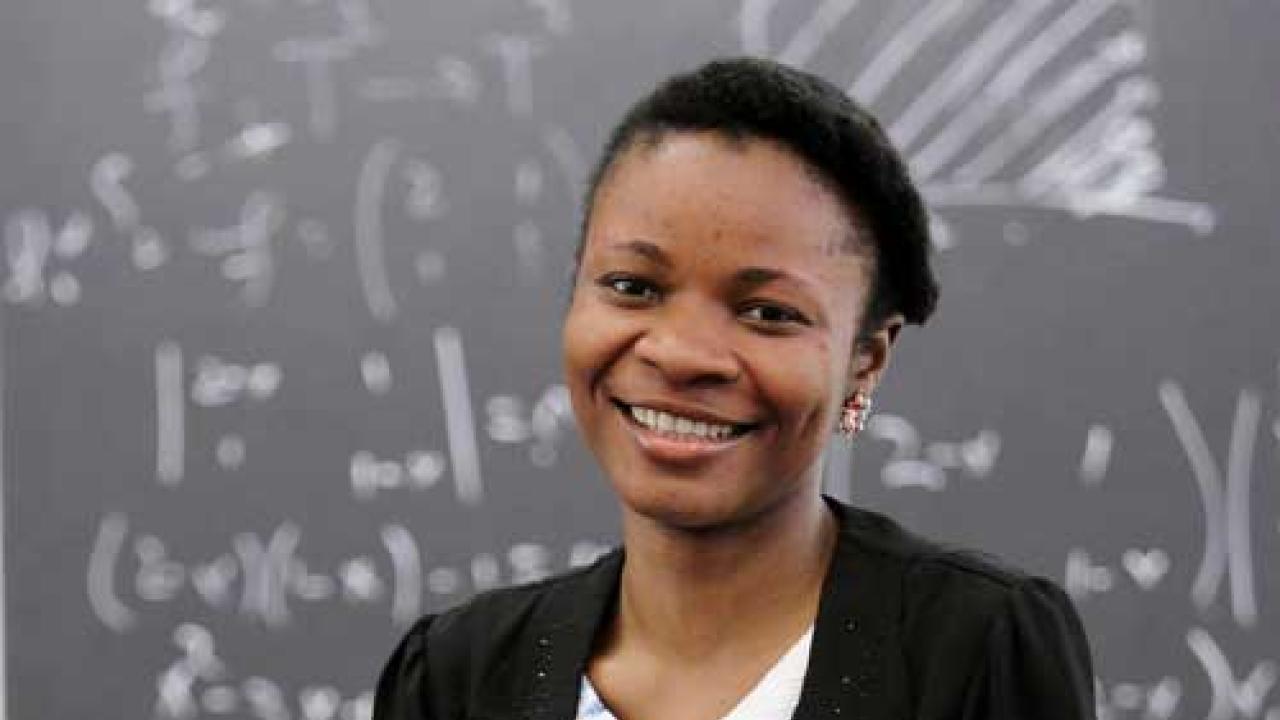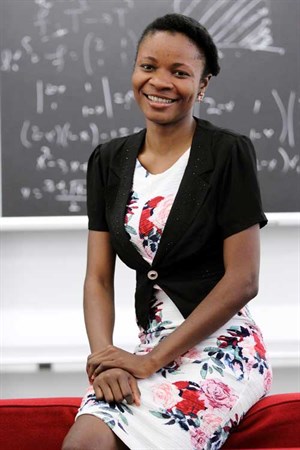
Mathematics at any level can be scary to some people, numbers and letters swirling in foreign patterns. But math is very far from frightening to Blessing Bisola Oni, one of the top students in the 2018 class of mathematics Postgraduate Diploma students who comes to ICTP from Saki, Nigeria. “When I was deciding what to study for my bachelors, I considered medicine, or chemical engineering. But I hate biology, and I really enjoy mathematics,” she remembers. “I love math, and I see that people are scared of math. I want to make it simple for everyone, to show everybody that they can do math and enjoy it.” Oni’s confidence and ease make her a great ambassador for pure mathematics, which she has studied since getting her B.Sc. at the University of Ibadan, in Ibadan, Nigeria. She then went on to AIMS Ghana to earn her masters degree. “I found out about ICTP and the Diploma Programme during my bachelors, but it was intimidating. I felt like, what do I know, so I went to AIMS for a year and made a lot of connections with other researchers,” says Oni. “That’s where I got the boldness to apply to ICTP, and I’m so glad I came.”
Oni’s confidence and ease make her a great ambassador for pure mathematics, which she has studied since getting her B.Sc. at the University of Ibadan, in Ibadan, Nigeria. She then went on to AIMS Ghana to earn her masters degree. “I found out about ICTP and the Diploma Programme during my bachelors, but it was intimidating. I felt like, what do I know, so I went to AIMS for a year and made a lot of connections with other researchers,” says Oni. “That’s where I got the boldness to apply to ICTP, and I’m so glad I came.”
At ICTP, Oni has dived into the rigorous schedule of pure math classes that makes up the one-year Diploma programme. “What I love about this programme is that the professors are so open to questions,” Oni says. “They don’t look down on you, they want to help you learn— that attitude isn’t common in my country.” Oni cites ICTP mathematician Claudio Arezzo as the type of teacher she wants to be: “In his class you don’t get lost, he always tells stories behind a particular concept or development which motivates me to want to learn.” The diversity of courses Diploma students take led Oni to realize how much she enjoys algebra. “I’ve found that anything algebraic catches my attention.”
That interest led to her Diploma thesis topic, the theory of sheaves, with her advisor Lothar Göttsche. She’s working with the theory of sheaves on topological spaces, which helps to keep track of local algebraic data attached to open subsets of topological spaces. “It’s like using a microscope to see what’s happening inside these spaces." This work provides a language mathematicians can use to describe geometric objects. Oni wants to further this work during her PhD, which she will be doing in Trieste: she has been accepted into the ICTP-SISSA doctorate programme. “I’m looking forward to meeting other mathematicians, learning about other styles and areas of research during my PhD,” Oni says.
Before starting her PhD, Oni has a welcome break of a few months after she defends her Diploma thesis. “I’ll get to sleep then! And see some of the things around Trieste and Italy that I didn’t have time to see during the intense Diploma Programme.” Then Oni will spend some time at home, which she has missed. “My family has been super supportive of me and my studies,” says Oni. Her father studied mathematics, and several of Oni’s older siblings are scientists as well: one sister is doing a PhD in microbiology and her brother works in solar panel technology. “At first my mother was hoping I would study computer science, because she thought it would be easier to get a job. But then I came home with first in my class for my bachelors in mathematics, and since then she’s seen this is where I should be.”
Oni's home country of Nigeria is rapidly growing, and plans to join the world’s top twenty economies by 2020. But that growth has not been reflected in the country’s science and research arenas, with only 39 researchers per million citizens, compared to Senegal’s 361. The terrorist group Boko Haram has made life and studying difficult in northern Nigeria, with its name meaning “Books are Forbidden.” The government has professed an interest in supporting science, but significantly less than 1% of the GDP of Nigeria is spent on research and development, a common target in other countries. A national science granting foundation has long been planned, but has failed to materialize. Mobility for all scientists in Africa is also difficult, with most West African scientists working in isolation from their peers. But Nigeria is joining other African nations in an effort to fight this lack of mobility, hosting several centers of excellence in different fields, designed to strengthen networks and collaboration.
Wherever she is, Oni aims to be part of the effort to strengthen science by encouraging everyone to not be afraid of mathematics. “Especially ladies, when they go into science it is usually in other sections. I want to help young women to get into mathematics, because it’s really not a gender-dependent thing,” says Oni. “Coming to ICTP has really changed my life, it has opened so many doors of opportunity for me. I hope ICTP continues to touch lives like this, and I hope I can do something similar throughout my career.”
---- Kelsey Calhoun













